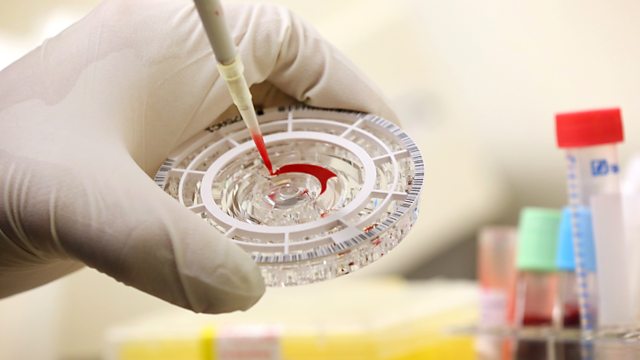Blood
Blood, in sickness and in health. With writer Lawrence Hill, forensic pathologist Gillian Leak and blood scientist Kikkeri Naresh.
What do you see in a phial of blood? A life sustaining fluid teeming with millions of cells? Evidence to solve a terrible crime? Samira Ahmed explores blood in medicine, at crime scenes, and in our bodies and minds, with the help of Canadian writer Lawrence Hill who鈥檚 written a biography of the red stuff, Dr Gillian Leak, a forensic expert in crime scene blood pattern analysis, and Professor Kikkeri Naresh seeking to unlock the mysteries of blood cancer.
Photo credit: Getty Images
Last on
Clip
-
![]()
The Key to Victory in Sport: Willpower? Muscle strength? Blood?
Duration: 00:46
Chapters
-
Lawrence Hill
A biography of blood
Duration: 13:03
Gillian Leak
Reading blood stains at crime scenes
Duration: 07:34
60 Second Idea
Artificial blood
Duration: 04:01
Kikkeri Naresh
Unlocking the secrets of blood cancers
Duration: 13:01
Lawrence Hill
![Lawrence Hill]() Lawrence Hill is an award winning Canadian writer who has recently written a book called Blood: A Biography of the Stuff of Life. It is a very personal series of observations and investigations following the flow of blood,聽 literally and figuratively, through science, art, politics, religion and literature.
Lawrence Hill is an award winning Canadian writer who has recently written a book called Blood: A Biography of the Stuff of Life. It is a very personal series of observations and investigations following the flow of blood,聽 literally and figuratively, through science, art, politics, religion and literature.
Photo courtesy of Lawrence HillGillian Leak
![Gillian Leak]()
Dr. Gillian Leak is a blood pattern analysis and crime scene expert. She is an internationally recognized specialist in the field of blood pattern analysis and was formerly the UK's Forensic Science Service National Scientific Lead for the discipline.
Kikkeri Naresh
![Kikkeri Naresh]()
Professor Kikkeri Naresh has worked in the field of haematopathology for over 20 years, leading and training health professionals across three continents. 聽At the Hammersmith Hospital and Imperial College in London he focuses on diagnostics, translational research and training in blood pathology, and has a particular interest in cancers of the blood.
60 second idea to improve the world
![60 second idea to improve the world]()
Gillian Leak wants to develop artificial blood for medical purposes that doesn't require refrigeration and has long term storage capabilities. This would mean that it could be shipped at a moment鈥檚 notice to any disaster in the world and would be incapable of transmitting any type of disease. Where appropriate, drugs could be added to the sample prior to infusion if necessary.
Broadcasts
- Sat 23 Aug 2014 21:05GMT大象传媒 World Service Online
- Sun 24 Aug 2014 09:05GMT大象传媒 World Service Online
- Mon 25 Aug 2014 02:05GMT大象传媒 World Service Online
Podcast
-
![]()
The Forum
The programme that explains the present by exploring the past







